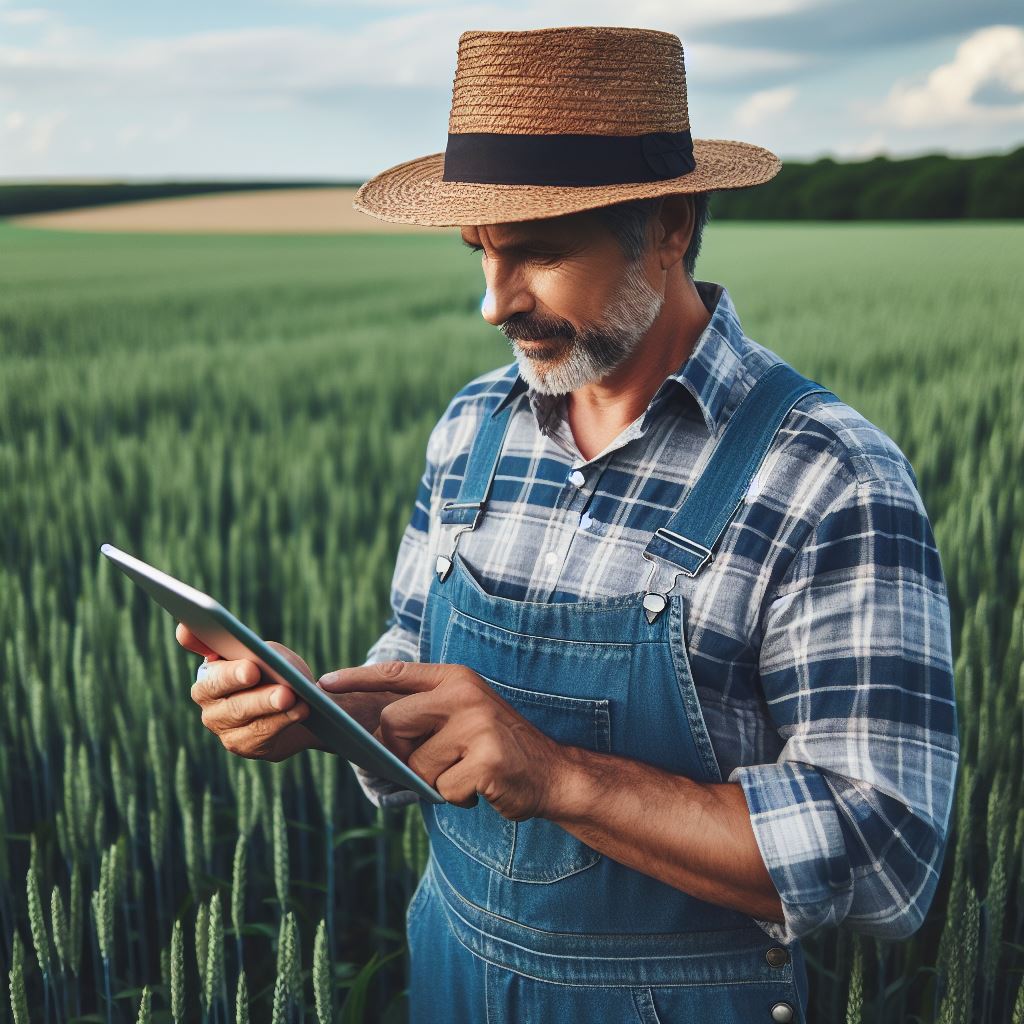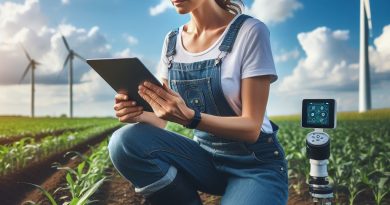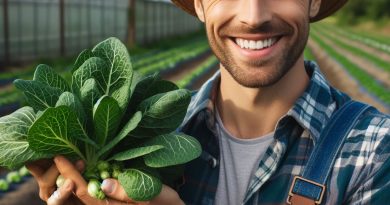Future of Farming: AI and Machine Learning in Agri-Tech
Last Updated on January 20, 2024
Introduction
Agriculture is a crucial industry, providing food and resources for a growing population.
However, traditional farming methods face numerous challenges, including limited resources, climate change, and a need for increased efficiency.
Advancements in agricultural technology, specifically AI and machine learning, offer hope for overcoming these obstacles.
AI and machine learning technologies are revolutionizing the way farming is done.
These advanced technologies have the potential to optimize farming practices, increase crop yields, reduce waste, and make agriculture more sustainable.
The integration of AI and machine learning in agri-tech is key to shaping the future of farming.
These technologies can analyze vast amounts of data, including satellite imagery, weather patterns, and soil conditions, to provide valuable insights.
Farmers can use this information to make informed decisions, such as adjusting irrigation schedules, optimizing fertilizer usage, and predicting crop diseases.
The benefits of AI and machine learning in agri-tech are far-reaching.
By optimizing resource allocation, farmers can minimize waste and reduce the environmental impact of farming.
Additionally, these technologies enable precision agriculture, allowing for targeted interventions and personalized crop management.
This not only maximizes harvests but also minimizes the need for chemical inputs, benefiting both the farmer and the consumer.
In summary, the future of farming relies heavily on the integration of AI and machine learning in agri-tech.
These technologies have the potential to transform agriculture, making it more efficient, sustainable, and resilient in the face of global challenges.
With continued advancements and adoption, AI-powered farming holds great promise for the future of food production.
Understanding AI and Machine Learning
In this section, we will delve into the concepts of Artificial Intelligence (AI) and Machine Learning (ML), and explore their applications in various industries.
Additionally, we will discuss the relevance of ML to agri-tech and how AI and ML complement each other in farming.
Define AI and its applications in various industries
- AI refers to the simulation of human intelligence in machines that are programmed to think and learn.
- AI has revolutionized various industries such as healthcare, finance, manufacturing, and transportation.
- In healthcare, AI can assist in diagnosing diseases and analyzing medical images.
- In finance, AI algorithms can predict market trends and optimize investment strategies.
- In manufacturing, AI-powered robots enhance efficiency by automating tasks and improving precision.
- In transportation, AI enables self-driving cars and optimizes route planning for logistics.
- These are just a few examples, highlighting the vast potential of AI to transform industries.
The concept of machine learning and its relevance to agri-tech
- Machine Learning is a subset of AI that enables systems to automatically learn and improve from experience.
- It involves the development of algorithms that can analyze data, identify patterns, and make predictions.
- In agri-tech, machine learning can optimize crop yields, detect plant diseases, and predict weather patterns.
- By analyzing large datasets, ML algorithms can provide valuable insights for efficient farming practices.
- For example, machine learning models can help farmers determine the optimal amount of fertilizer to use.
- ML also allows for precision agriculture, where sensors and data analysis optimize irrigation and pesticide usage.
- The application of ML in agri-tech contributes to sustainable farming and increased productivity.
How AI and machine learning complement each other in farming
- AI and machine learning are highly complementary in the field of agriculture.
- AI provides the framework for machines to exhibit intelligence and decision-making capabilities.
- Machine learning algorithms enable these machines to learn and improve from data.
- By combining AI and ML, farmers can leverage advanced technologies to overcome agricultural challenges.
- For instance, AI-powered drones equipped with ML algorithms can monitor crop health and optimize pesticide application.
- ML can also analyze historical and real-time data to predict crop diseases and provide early warnings.
- Furthermore, AI systems can automate repetitive tasks, such as harvesting and sorting, increasing efficiency.
- Overall, the integration of AI and ML in farming leads to smarter decision-making and sustainable practices.
In essence, AI and Machine Learning have significant applications in various industries and are revolutionizing agri-tech.
The ability of machines to think and learn, coupled with data analysis capabilities, enables farmers to optimize crop yields, make informed decisions, and promote sustainability.
The integration of AI and ML in farming holds tremendous potential for the future of agriculture.
Read: Drones in Agri: Boosting Crop Efficiency
Potential Applications of AI and Machine Learning in Agri-Tech
AI and machine learning have the potential to revolutionize the agri-tech industry.
In this section, we will explore the various applications of these technologies in farming and agriculture.
Crop and Soil Monitoring
Use of AI-powered drones and sensors for real-time data collection
One of the key applications of AI and machine learning in agri-tech is crop and soil monitoring.
Traditional methods of data collection are time-consuming and lack real-time insights.
However, with the use of AI-powered drones and sensors, farmers can collect data on crop growth, soil conditions, and environmental factors in real-time.
This enables them to make informed decisions and optimize their farming practices.
Application of machine learning algorithms to analyze soil quality and crop health
Additionally, machine learning algorithms can analyze the collected data to assess soil quality, detect nutrient deficiencies, and identify any signs of crop stress or disease.
By monitoring crops and soil conditions more accurately, farmers can take necessary actions to ensure higher yields and better crop health.
Precision Agriculture
Utilization of AI to optimize irrigation and fertilization practices
Precision agriculture aims to optimize farming practices by using technology to tailor the application of inputs such as water, fertilizers, and pesticides to individual plants or sections of a field.
AI plays a crucial role in achieving precision agriculture objectives.
By utilizing AI, farmers can optimize their irrigation and fertilization practices based on real-time data collected through sensors.
Implementation of machine learning algorithms to enhance crop yield predictions
Machine learning algorithms can analyze this data and provide recommendations on the precise amount of water and nutrients needed for optimal crop growth.
Moreover, these algorithms can also predict crop yields, enabling farmers to plan their production and resources more effectively.
The implementation of AI and machine learning in precision agriculture leads to improved resource management, reduced costs, and increased overall productivity
Pest and Disease Detection
Integration of AI and machine learning to identify pests and diseases accurately
Pests and diseases can cause significant damage to crops if not detected and controlled early.
AI and machine learning offer powerful tools for accurate identification and prevention of pests and diseases.
By integrating AI and machine learning algorithms, farmers can analyze data from various sources, including images and sensor data, to accurately identify pests and diseases affecting their crops.
This allows for targeted interventions, minimizing the use of pesticides and reducing environmental impact.
Development of automated systems for early detection and prevention
Additionally, automated systems can be developed to monitor and detect early signs of pests and diseases.
This early detection enables timely interventions, preventing the spread and minimizing crop losses.
Smart Farming Equipment
Introduction of AI-controlled machinery for improved efficiency and reduced labor
- AI and machine learning can also revolutionize the equipment used in farming.
- AI-controlled machinery, such as autonomous tractors and harvesters, can perform tasks with precision, reducing the need for manual labor.
- These machines can be equipped with sensors and algorithms to adapt to changing field conditions, optimize fuel consumption, and increase operational efficiency.
- Furthermore, machine learning algorithms can analyze data collected by smart farming equipment, providing insights for continuous improvement in performance and productivity.
- By incorporating AI and machine learning into farming equipment, farmers can achieve higher efficiency, reduce operational costs, and improve overall productivity.
In short, the potential applications of AI and machine learning in agri-tech are vast and transformative.
From crop and soil monitoring to precision agriculture, pest and disease detection, and smart farming equipment, these technologies have the ability to revolutionize the farming industry.
By harnessing the power of AI and machine learning, farmers can make data-driven decisions, optimize resource allocation, and ultimately enhance their productivity and sustainability.
Read: Drones: Transforming Agricultural Practices
Benefits of AI and Machine Learning in Agri-Tech
Increased Productivity and Efficiency
- AI and machine learning technologies can analyze vast amounts of data to optimize farm operations.
- By using real-time monitoring and analysis, farmers can identify and address issues promptly.
- Automation of tasks such as irrigation, planting, and harvesting can significantly increase productivity.
- AI-powered robots and drones can perform precise and repetitive tasks with higher accuracy and efficiency.
- Predictive analytics can anticipate crop diseases and pests, enabling timely interventions to prevent losses.
- AI algorithms can analyze weather patterns to optimize planting schedules and ensure the best crop yield.
Cost Reduction and Resource Optimization
- Precision agriculture powered by AI and machine learning can reduce the need for excessive resources.
- With AI-driven insights, farmers can optimize the usage of fertilizers, water, and other inputs.
- Accurate crop yield predictions help farmers plan efficiently, reducing wastage and minimizing costs.
- AI algorithms can identify areas with low productivity or excessive resource consumption, allowing targeted improvements.
- Machine learning models can optimize machinery usage, reducing fuel consumption and maintenance costs.
- By minimizing human errors and inefficiencies, AI and machine learning technologies help reduce production costs.
Enhanced Sustainability and Environmental Impact
- AI technologies in agri-tech can promote sustainable farming practices.
- IoT sensors can monitor soil moisture levels, helping farmers practice efficient irrigation techniques.
- Machine learning algorithms can detect crop diseases and pests early, minimizing the need for chemical interventions.
- AI-powered drones and robots can target specific areas for pesticide application, reducing environmental impact.
- Analyzing satellite imagery and weather data can help farmers implement precision agriculture techniques.
- By reducing resource wastage and using eco-friendly practices, AI contributes to a greener and more sustainable future.
Improved Decision-Making and Predictive Analytics
- AI and machine learning algorithms analyze vast amounts of data to provide actionable insights.
- Farmers can make informed decisions regarding crop management, based on real-time data and predictive analytics.
- Predictive models can forecast market demand, enabling farmers to optimize crop selection and pricing strategies.
- AI-powered systems can integrate data from multiple sources to provide a comprehensive view of the farm’s operations.
- Advanced monitoring technologies help farmers detect subtle changes in soil conditions, ensuring timely interventions.
- By leveraging AI and machine learning, farmers can gain a competitive edge through data-driven decision-making.
In general, AI and machine learning in agri-tech offer numerous benefits to the farming industry.
Increased productivity and efficiency, cost reduction, and resource optimization are key advantages.
Enhanced sustainability and environmental impact contribute to a greener future. Improved decision-making and predictive analytics enable farmers to make informed choices.
Harnessing the power of AI and machine learning is vital for the future of farming, as it revolutionizes traditional practices and drives the industry towards innovation.
Read: Farm Drones: Revolutionizing Crop Management

Challenges and Limitations of AI and Machine Learning in Agri-Tech
In spite of the numerous advantages that AI and machine learning bring to agri-tech, there are several challenges and limitations that need to be addressed.
These include:
Data Accessibility and Quality
- Limited access to accurate and reliable agricultural data can hinder the effectiveness of AI and machine learning applications.
- Data quality issues, such as incomplete or inaccurate data, can lead to biased or flawed predictions.
- Ensuring widespread access to high-quality data across different regions and sectors remains a challenge.
Ethical and Privacy Concerns
- The use of AI and machine learning raises ethical concerns regarding privacy and data ownership.
- There is a risk of misuse or unauthorized access to sensitive agricultural data.
- Transparency and accountability in the use of AI algorithms and decision-making processes are crucial to address privacy concerns.
Integration and Adoption Barriers
- Integrating AI and machine learning technologies into existing agricultural systems can be complex and expensive.
- Lack of technical expertise and knowledge among farmers and agricultural professionals may limit the wide-scale adoption of these technologies.
- Resistance to change and skepticism towards new technologies can impede the integration of AI and machine learning in agri-tech.
Education and Training Requirements
- Ensuring that farmers and agricultural professionals have the necessary education and training to effectively use AI and machine learning is vital.
- There is a need for specialized programs and courses to equip individuals with the skills to utilize these technologies.
- Investment in training and education initiatives can support the successful implementation of AI and machine learning in agri-tech.
Addressing these challenges and limitations is crucial to fully unlock the potential of AI and machine learning in agri-tech.
Governments, industry stakeholders, and research institutions must collaborate to overcome these hurdles and create an enabling environment for the widespread adoption of these technologies.
Read: Aerial Farming: Drones as Key Tools
Current Examples and Success Stories
Significant advancements and successful implementations of AI and machine learning in farming
- Autonomous robots are being used to perform tasks such as planting and harvesting crops.
- AI-powered drones equipped with cameras and sensors enable farmers to monitor crops for diseases and nutrient deficiencies.
- Smart irrigation systems utilize machine learning algorithms to optimize water usage based on weather conditions and plant needs.
- Image recognition software helps identify weeds, enabling precise and targeted application of herbicides.
- AI-driven predictive analytics aid in crop yield forecasting, allowing farmers to make informed decisions about harvesting and storage.
- AI-powered sorting and grading technologies automate the process of sorting fruits and vegetables based on size, color, and quality.
- Virtual reality (VR) and augmented reality (AR) applications allow farmers to visualize and analyze their fields, improving decision-making.
The impact and outcomes of these initiatives
- Increased efficiency: AI and machine learning technologies automate repetitive tasks, saving farmers time and labor costs.
- Improved productivity: Real-time monitoring and analysis enable farmers to detect issues early and take prompt action, optimizing crop yield.
- Enhanced sustainability: Precise application of resources like water, fertilizers, and pesticides reduces waste and environmental impact.
- Cost reduction: AI-driven systems help minimize input costs by optimizing resource allocation and reducing reliance on manual labor.
- Disease prevention: Early detection of diseases and pests through AI-based monitoring prevents crop loss and reduces the need for chemical treatments.
- Higher quality produce: Automated sorting and grading systems improve consistency, resulting in higher-quality products that fetch better prices.
- Data-driven decision-making: AI analytics provide valuable insights, enabling farmers to make data-backed decisions for better farm management.
Inspiring and encouraging further innovation in agri-tech
- The success stories mentioned above highlight the tremendous potential of AI and machine learning in agriculture.
- By embracing these technologies, farmers can improve their operations, increase profitability, and contribute to sustainable farming practices.
- Continued innovation and collaboration between tech companies, farmers, and researchers will drive further advancements in agri-tech.
- Governments and policymakers should support and promote the adoption of AI and machine learning in agriculture to ensure food security and sustainability.
- Entrepreneurs and startups should explore opportunities to develop customized solutions for specific farming needs and challenges.
- Education and training programs should be developed to equip farmers with the necessary skills to harness the potential of agri-tech.
- With the right investments and support, AI and machine learning have the power to revolutionize the future of farming, making it more efficient, sustainable, and profitable.
In a nutshell, current examples and success stories demonstrate how AI and machine learning have already made significant advancements in agri-tech.
These innovations have had a positive impact on farming, improving efficiency, productivity, and sustainability.
By inspiring further innovation and encouraging collaboration, we can unlock the full potential of AI and machine learning in agriculture, leading to a more sustainable and prosperous future for the industry.
Conclusion
The future of farming lies in the hands of AI and machine learning, as these technologies have the power to completely revolutionize the agricultural sector.
Throughout this blog post, we have explored the various ways in which AI and machine learning are being integrated into agri-tech, and the potential benefits they offer.
From precision farming and automated machinery to crop yield prediction and disease detection, the applications of AI and machine learning in agriculture are vast and promising.
These technologies enable farmers to make data-driven decisions, optimize resources, and increase productivity.
The significance of AI and machine learning in shaping the future of farming cannot be overstated.
With a rapidly growing global population and limited resources, the need for sustainable and efficient agricultural practices has never been greater.
AI and machine learning offer the potential to meet this demand by providing farmers with valuable insights, improving crop yields, and reducing environmental impact.
As we look to the future, it is essential for farmers, industry stakeholders, and policymakers to embrace agri-tech advancements.
The adoption of AI and machine learning in agriculture can enable us to overcome challenges such as climate change, food security, and labor shortages.
By harnessing the power of these technologies, we can create a more resilient and sustainable agricultural ecosystem.
Ultimately, AI and machine learning have the potential to transform farming and address the complex challenges facing the industry.
By embracing agri-tech advancements, we can pave the way for a future where farming is not only productive but also environmentally conscious.
Let us anticipate the possibilities and work towards building a more efficient and sustainable agricultural future.


